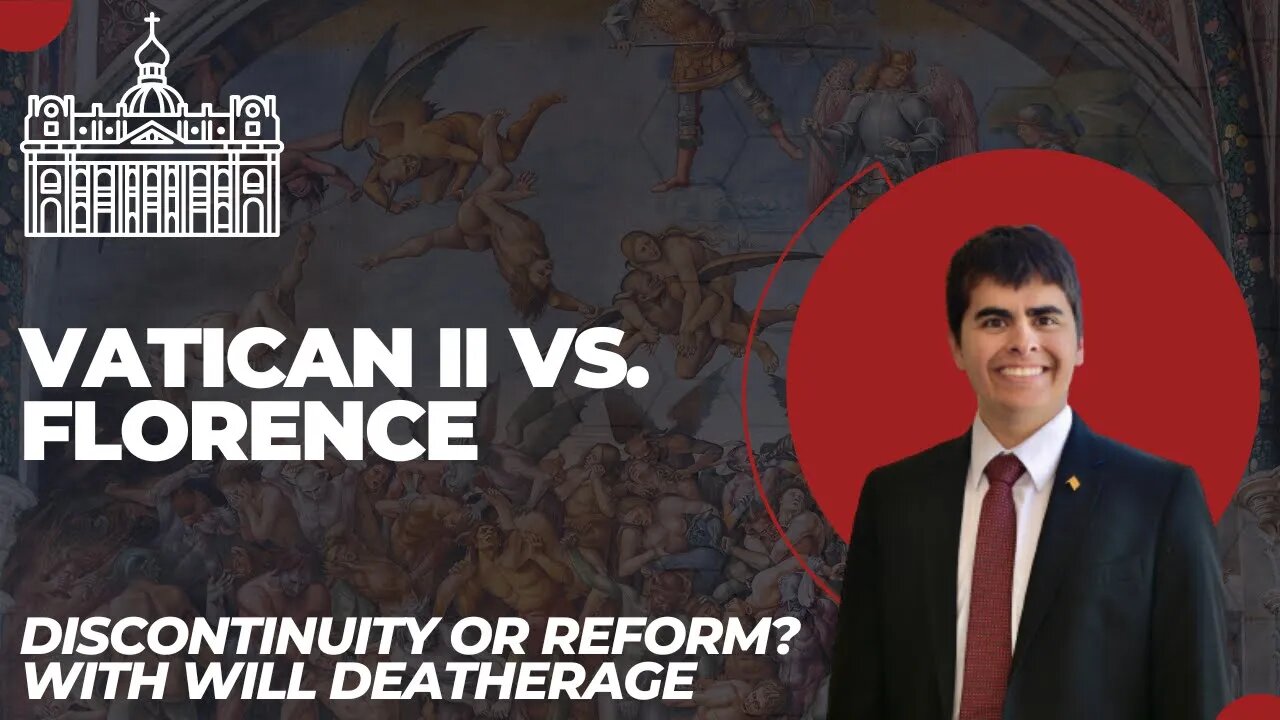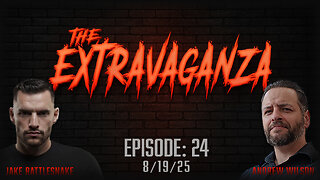Premium Only Content

Vatican II vs. Florence (Discontinuity or Reform Episode 7)
"Each conciliar document has a fundamentally different intention, the former focusing on Christian unity with the East, not formally commenting on the subject of other religions, and the latter systematically and thoroughly commenting on that matter; given their different intentions, there is clearly no contradiction here. The assumptions each council makes are also starkly different. The former assumes that its audience has no excuse to leave the visible Church because the Gospel has been thoroughly embedded into society. The latter, on the other hand, addresses a post-Christendom world and recognizes the value other religions can serve as preparation for Christ. There is no discontinuity here, either. Florence’s scope is confined to Coptic Christian audiences, and its expression of NSOC is arguably directed at Christians who are considering leaving the Church. Lumen Gentium is addressed to the universal Church, as well as non-Christians. Thus, the differences in scope also signify no discontinuity. Florence’s expression of NSOC was soundly rejected by both theological and magisterial authorities, whereas Vatican II’s has (so far) been staunchly defended; there is no discontinuity here. Finally, the theological beliefs like invincible ignorance that the Florentine Fathers believed in, even if Cantate Domino did not acknowledge them, are invoked by Lumen Gentium, which demonstrates continuity between their theologies."
Read the Thesis Here: https://clarifyingcatholicism.org/essays/theses/florence-and-vatican-ii-on-other-religions-discontinuity-or-reform/
Music:
Clarity by ARSNK: https://soundcloud.com/arsnkmusic/clarity-ft-joe-pettis
Outro: Bright White by Shifting Shadows https://from-the-forest.bandcamp.com/album/lighthearted-ep
The Second Vatican Council’s theology of other religions is frequently cited as an example of doctrinal discontinuity in the Catholic Church, since the language of Lumen Gentium 16 from Vatican II seemingly contradicts that of Cantate Domino from the Council of Florence. At face value, the two statements appear at odds; whereas the latter condemns non-Christians to hell, the former asserts that practitioners of other religions can be saved. However, an analysis of each document’s source, authoritative level, intention, assumptions, scope, reception, and accompanying theological ideas reveals that they actually express and apply the same dogmatic principles to different time periods and cultural contexts, which constitutes authentic reform, rather than discontinuity.
Series on Ecumenical Councils: https://www.youtube.com/playlist?list=PLPnp45TCxDtPeT-lOsnFhGn2bShv0vAoL
Series on Magisterial Authority: https://www.youtube.com/playlist?list=PLPnp45TCxDtNMKUDRtQ15pZDTBCCj4Xg_
-
 1:07:59
1:07:59
BonginoReport
5 hours agoBoston Mayor Defies Trump, Protects Illegals - Nightly Scroll w/ Hayley Caronia (Ep.115)
98.4K59 -
 40:45
40:45
Donald Trump Jr.
6 hours agoPeace by Peace: Solving One Problem After Another | Triggered Ep.268
52.1K52 -
 LIVE
LIVE
FrizzleMcDizzle
2 hours ago $0.43 earnedRemnant 2 - Dark Souls-like Shooter?!
114 watching -
 LIVE
LIVE
FoeDubb
1 hour ago🏰KINGDOM MENU: 🏈FOOSBALL & 🎮DELTA FORCE PEW PEWS DILLY DILLY!!
30 watching -
 11:43:31
11:43:31
GritsGG
13 hours agoWin Streaking! Most Wins 3390+ 🧠
60.9K -
 1:08:29
1:08:29
TheCrucible
5 hours agoThe Extravaganza! Ep. 24 (8/19/25)
79.3K18 -
 4:22:25
4:22:25
sophiesnazz
6 hours ago $0.83 earnedLETS TALK ABOUT BO7 !socials !specs
19.1K -
 1:27:30
1:27:30
Redacted News
6 hours ago"There will be consequences!!!" Trump issues big threat to Putin ahead of peace summit | Redacted
104K165 -
 LIVE
LIVE
Amish Zaku
4 hours agoWar Thunder - Tank Tuesday - then Peak
54 watching -
 1:27:05
1:27:05
Kim Iversen
5 hours agoIsrael DEMANDS X Remove Posts and X COMPLIES | Socialist Groceries Coming To A Store Near You!
53.7K126